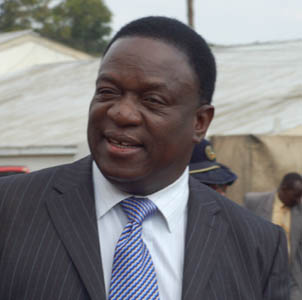


On Tuesday, Tsvangirai summoned Defence Minister, Emmerson Mnangagwa; Home Affairs Minister, Kembo Mohadi and State Security Minister, Sidney Sekeramayi to his Munhumutapa offices where he emphasised the need to restore the rule of law and safeguard the independence of the judiciary.
Mnangagwa — a confidante of President Mugabe — is in charge of the Zimbabwe Defence Forces (ZDF) comprising the Zimbabwe National Army (ZNA) and the Air Force of Zimbabwe (AFZ).
Mohadi, who took over the Home Affairs Ministry in 2002, oversees the Zimbabwe Republic Police (ZRP), the Attorney General’s Office and the Registrar General’s Office jointly with the Movement for Democratic Change (MDC)’s Giles Mutsekwa, while the dreaded Central Intelligence Organisation falls under Sekeramayi’s portfolio.
Tsvangirai’s spokesperson, James Maridadi, confirmed yesterday that the three Ministers had indeed pledged their support for the inclusive government and prioritised the restoration of the rule of law as they begun their duties this week.
“The ministers also pledged to investigate reports of the recent invasion of a farm belonging to Interfresh in Mazoe with a view to addressing the situation. The Prime Minister in turn pledged total support to the Ministers,” said Maridadi.
Despite the assurances to restore the rule of law seen as the precursor to the transformation of the country’s battered economy all eyes would be on Zimbabwe’s influential security chiefs to see if they will honour these pledges.
The security chiefs, particularly ZDF Commander, Constantine Chiwenga, Perence Shiri (AFZ Commander), Phillip Sibanda (ZNA Commander) and Augustine Chihuri (ZRP Commissioner-General), were conspicuous by their absence at Tsvangirai’s swearing-in ceremony held last week.
Chiwenga and the Zimbabwe Prison Services Commissioner, Retired Major General Paradzayi Zimondi vowed ahead of the March 2008 synchronised polls that they would not salute the MDC-T leader should he win the Presidential election which failed to produce a clear winner.
Asked about Tuesday’s meeting, Mohadi told The Financial Gazette that they (Ministers) had discussed the restoration of the rule of law and guarding the independence and integrity of the judiciary.
“We discussed these issues, but I cannot go into detail,” he said. has faced a barrage of criticism for disregarding the rule of law ever since his party lost its bid to overhaul the country’s constitution in February 2000.
In an act of vengeance, the war veterans who aligned themselves with ZANU-PF, unleashed an orgy of violence to punish the white commercial farmers for coercing over a million people to vote against the proposal. This led to the haphazard land reforms which to this day, continue to disrupt farming activities.
Zimbabweans have suffered mental and physical torture over the years, and many have lost their lives as a result of an assault on the constitutional rights of citizens to liberty, fair trial, arbitrary searches, deprivation of property rights , protection from inhuman treatment, freedom of expression, assembly and association and protection of the law.
Tsvangirai himself is a victim of the breakdown of the rule of law.
In March 2007, he was arrested and thoroughly beaten at Machipisa Police Station where he had gone to seek an explanation regarding the arrest of his supporters who were being held under unclear circumstances.
The MDC-T leader sustained severe head injuries.
Journalists have not been spared either. The severe torture and illegal detention of several journalists including Ray Choto and Mark Chavunduka (late) are testimonies to the deterioration of the rule of law.
Media watchdogs recorded more than 100 media violations last year alone including arbitrary arrests of scribes.
Observers say Tsvangirai has an immediate task of asserting his authority and ensuring that he controls and manages President Mugabe’s ministers to please foreign donors who have insisted on the return of order in Zimbabwe and respect for property rights as a condition for external funding needed to resuscitate the country’s suffocating economy.
Meanwhile, a Manicaland provincial magistrate, Livingstone Chipadze, yesterday ruled there are enough reasonable grounds to suspect Bennett has a case to answer.
He said the MDC-T national treasurer should not be removed from remand on charges of contravening Section 10 of the Public Order and Security Act or the alterative charge of possessing firearms without ministerial authority.
Bennett is alleged to have stockpiled weapons for the purposes of insurgency, banditry, sabotage or terrorism.
Chipadze ruled there are reasonable grounds to suspect Bennet worked in common cause with Peter Michael Hitschmann, the police constabulary already serving a four year jail term for a similar offence.
Bennett was remanded in custody to March 4 this year. There was a deafening silence in court after the ruling. Bennett, clad in torn prison garb, remained clam throughout the process. He, however, looked distressed and tired. He shook his head after the magistrate delivered the ruling.
His lawyers will now have to apply to the High Court to get bail.
But Bennert was cleared on lesser charges of contravening immigration laws when he allegedly attempted to leave the country for South Africa on February 13 without presenting himself to an immigration officer.
Tension is building up in the eastern border city of Mutare, Manicaland Province. Armed police are patrolling the streets supported by two water cannons.”If the Prime Minister speaks, he speaks on behalf of all of us. If he has said something even through his office official, that is the position. He will have spoken for all of us,” he added.
The Prime Minister’s attempts to restore order might hit a snag in the wake of recent incidents that seem to run contrary to the spirit of the inclusive government.
Commercial Farmers Union chief executive officer, Hendriek Olivier, revealed this week that the remaining few white commercial farmers were being forcibly evicted from their farms by alleged ZANU-PF supporters, unhappy with the formation of the inclusive government.
Olivier said the white farmers were this month issued with summons to appear in court to answer charges of resisting to vacate their properties.
But the new Minister of Lands and Resettlement, Herbert Murerwa, yesterday promised to investigate the reports and assess the claims.
The fresh farm invasions come against the backdrop of the arrest of Roy Bennett, Tsvangirai’s nominee for deputy minister of agriculture on charges of terrorism, sabotage and insurgency.
Yesterday, the three principals, President Mugabe, Tsvangirai and Deputy Prime Minister Arthur Mutambara met and received a report from the Joint Monitoring and Implementation Committee on the status of Bennett and other political prisoners.
Sources said the principals agreed on the way forward although the finer details of the meeting remained sketchy at the time of going to print.
A number of MDC-T activists also continue to languish in remand prison on charges of attempting to overthrow President Mugabe’s administration.
President Mugabe’s government